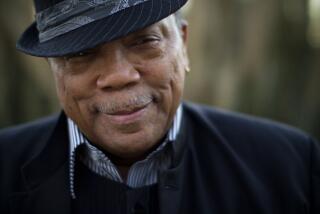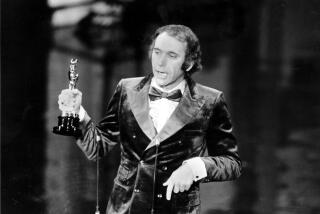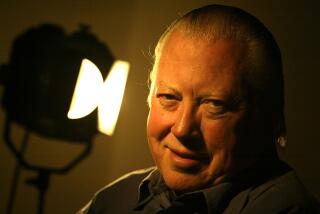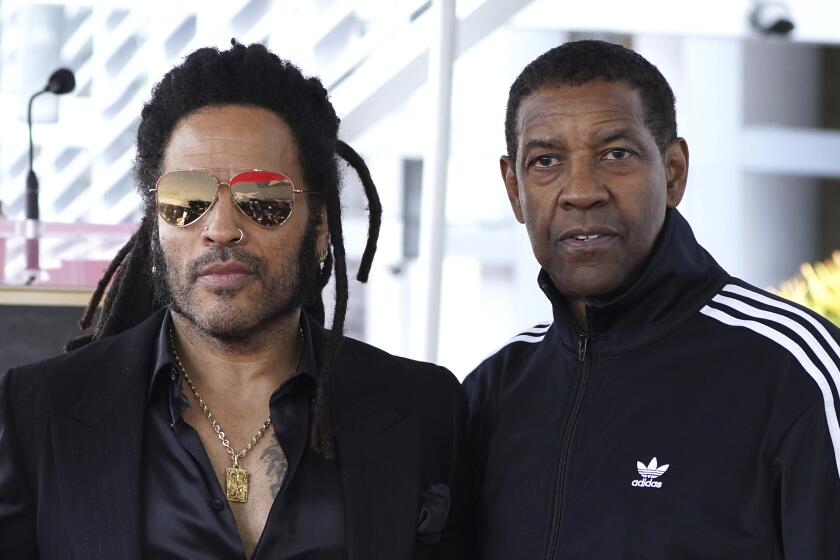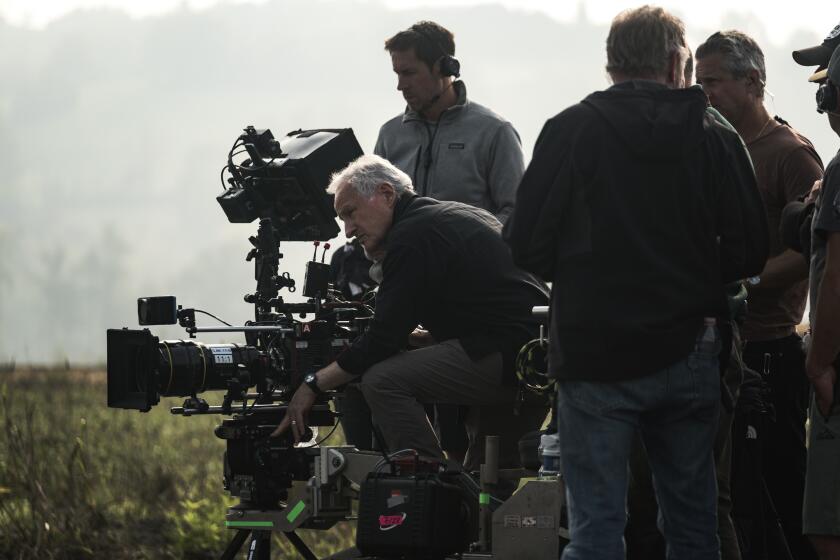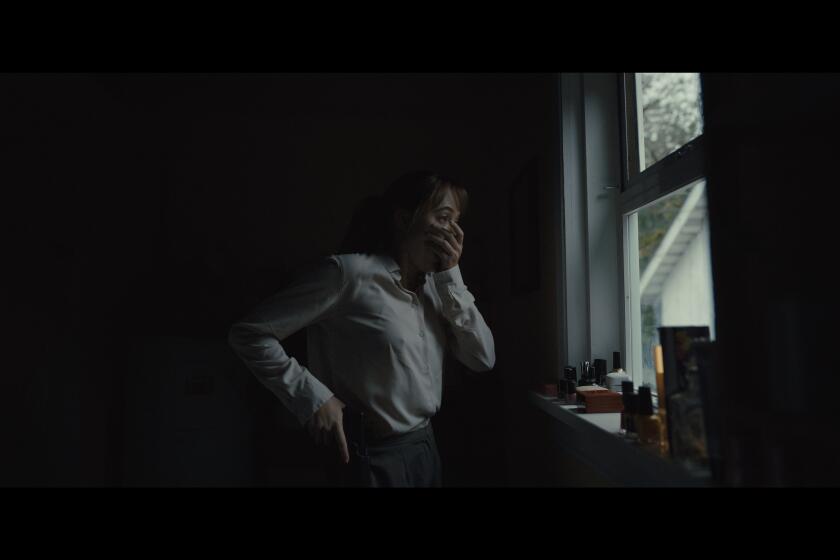Meryl Streep and Dustin Hoffman remember ‘All the President’s Men’ director Alan Pakula
Alan J. Pakula, who died in 1998 at the age of 70 in an auto accident, was a most unusual filmmaker. Though his peers, including Stanley Kubrick, Martin Scorsese, Steven Spielberg, Roman Polanski, George Lucas and William Friedkin, were as well-known as the stars of their films, Pakula stayed out of the limelight and let his films speak for themselves.
And what films — some of the most memorable titles of the last half century.
Teaming up with director Robert Mulligan, he produced several films including the 1962 classic “To Kill a Mockingbird” and 1965’s “Inside Daisy Clover.” He moved to directing 50 years ago with “The Sterile Cuckoo,” a tragic love story for which Liza Minnelli earned her first Oscar nomination.
Then came his so-called “paranoia trilogy”: 1971’s thriller “Klute,” for which Jane Fonda won her first Academy Award; the chilling 1974’s “The Parallax View,” starring Warren Beatty, and 1976’s “All the President’s Men,” based on Washington Post reporters Carl Bernstein (Dustin Hoffman) and Bob Woodward’s (Robert Redford) account of how they broke the Watergate scandal that lead to President Richard Nixon’s resignation. The latter earned eight Oscar nominations, including for Pakula’s direction, and won four.
He was nominated for another Oscar for his adapted screenplay for 1982’s harrowing “Sophie’s Choice,” which gave Meryl Streep her second Oscar. Other films included the 1990 box-office hit thriller “Presumed Innocent,” starring Harrison Ford and his last production, 1997’s thriller “The Devil’s Own,” also with Ford, and Brad Pitt.
The AFI Fest in Hollywood is paying tribute to Pakula with free screenings of “Sterile Cuckoo,” “Klute” and “Sophie’s Choice” and a free screening Sunday evening of Matthew Miele’s thoughtful new documentary, “Alan Pakula: Going for Truth.” That film features insightful and often emotional interviews with Redford, Ford, Streep, Fonda and Hoffman, co-workers and family and numerous clips.
Streep, Hoffman, Ford and Miele, recently talked to The Times about what made Pakula such a powerful filmmaker and person. The quotes have been edited for clarity and brevity.
Meryl Streep
I think he really laid a map of integrity for artists, and that, more than anything, is his legacy for me. He was such a moral filmmaker. It’s like an old-fashioned idea, but he was. He was a moral man and he had a backbone.
He loved women and respected them. So I mean it was that thing where you feel listened to instead of tolerated. It’s a really a great, great quality. All the best male directors have it. All the best female directors have it naturally.
Our so-called rehearsal schedule — I think it was about three weeks that we never got off our [butts]. We just sat at the table and picked apart the text, almost like, rabbinical exegesis of texts inquiring into motivations. It was all very neck up. He was really asking a million questions. That was really unusual. I don’t think I’ve ever had that experience before or after. But then once we start shooting, that’s when we started rehearsing. He would come in early in the morning. We’d get all ready and then he’d shut down the set and send everybody away until lunch. And we rehearsed. And then we came back after lunch and we shot the whole movie in the afternoons. I was home in time to cook dinner for my husband and baby.
It felt so natural. I felt so free. Believe me, most of the time I’d come home [from filming], and I’m complaining about something. But in this case, I came home and said, “I feel like I can’t make a mistake, make a wrong move.” He wasn’t someone who drew all the limelight to himself. It was all about the work. He was so proud of what he did. It wasn’t for his own self-aggrandizement that he was in it. His ego was subsumed to the work. It was such a pleasure to work with him.
Dustin Hoffman
The first word that comes to mind about Pakula, I guess, is thorough. I remember when I came to shoot the movie in L.A., I was struck dumb when I walked on the set. Alan re-created the Washington Post newsroom so literally that I could not tell difference [from the real newsroom]. I think he had a lot of the rubbish that was in the wastebaskets [at the Post] mailed to the set and he used it.
I think in the documentary I did say that when we were shooting, we got three or four days behind in one scene because Alan was casting the extras or background people who were going to represent reporters. It was a very slow process for him. He wanted the faces to be exactly the kind of faces and manners he had seen when he researched it. So it took an inordinate amount of time.
I’ve worked with a variety of directors and they all of their own way of directing. There were directors who were certainly as thorough, but usually they have a very set way of working. Alan wasn’t married to that. He was able to do the kind of thing in my memory Hal Ashby would do — that is, he let you just play around in order to find things that worked for you.
He loved to present a kind of documentary style to his work. He even said, “Put the camera there and let the scene show itself. You don’t have to cut to a close-up, back and forth” — the kind of thing that a documentary does. And at the same time, I think he was a hidden poet.
Harrison Ford
There was a great deal of craft [in his work] as a writer, director and producer. He knew what he wanted to do when he made a movie. He wasn’t confused about it. He was a very practical man in many ways — an intellectual, for sure, but with a real warm heart. He was just a sweet man.
Sometimes, we rehearsed if it seemed that it was necessary. On “Presumed Innocent” and then also on “Devil’s Own,” there was a lot of talk during the period of time the script was being prepared. There was a lot of discussion about options and dialogue and character development.
As it is pointed out in the documentary, he wasn’t going for grand opera. What he wanted was the actor to give him human behavior, which would illustrate the story and engage the audience.
Of the old-school directors that I had a chance to work with earlier in my career — I don’t want to sound like I don’t admire all of them, but there was a grace about him, there was a simplicity. There was a quality of peace.
Matthew Miele
I was actually born in ’74 during his paranoia trilogy. I remember in high school, I watched “All the President’s Men.” It was what Alan had done with “All the President’s Men” that made journalism feel thrilling and made the chase and the pursuit of story an adventure. He could do that with just someone sitting at a desk making calls and finding the source. That really inspired me at at a young age.
By the time I was a young adult, I had seen all of his work. I always intended after I graduated from college in ’96 to thank him for guiding me into this career as a filmmaker, as a documentarian. When he died, it broke my heart. He had stories in front of him. I knew that he wasn’t done. I just thought I have to do something on him because that’s the ultimate way, I think, to really honor what he did for me.
Alan Pakula Tribute at AFI Fest
What: ‘Alan Pakula: Going For Truth’
When: Sunday at 7 p.m.
Where: TCL Chinese Theatre
Admission is free
What: ‘The Sterile Cuckoo’
When: Monday at noon
Where: Chinese Theatre No. 3
Admission is free
What: ‘Klute’
When: Nov. 20 at 2 p.m.
Where: TCL Chinese Theatre
Admission is free
What: ‘Sophie’s Choice’
When: Nov. 21 at 2 p.m.
Where: TCL Chinese Theatre
Admission is free
More to Read
Only good movies
Get the Indie Focus newsletter, Mark Olsen's weekly guide to the world of cinema.
You may occasionally receive promotional content from the Los Angeles Times.
